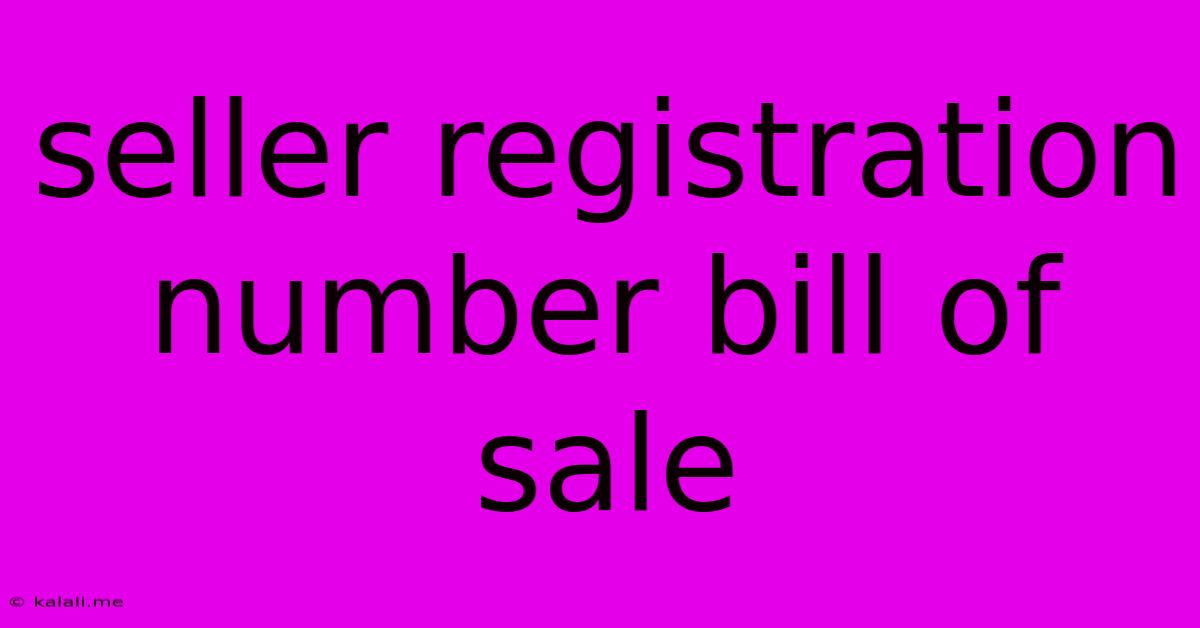Seller Registration Number Bill Of Sale
Kalali
May 29, 2025 · 3 min read

Table of Contents
Seller Registration Number on a Bill of Sale: Importance and Best Practices
A bill of sale is a crucial document in any transaction involving the sale of goods. While it details the transaction's specifics – like the items sold, price, and buyer/seller information – the inclusion of a seller registration number can significantly enhance its legal validity and traceability. This article delves into the importance of including this number and provides best practices for creating a comprehensive and legally sound bill of sale.
What is a Seller Registration Number?
A seller registration number, also known as a business registration number, vendor ID, or seller's permit number, is a unique identifier assigned to businesses by relevant authorities. The specific name and issuing body vary depending on the country and the type of business (sole proprietorship, partnership, LLC, etc.). This number verifies the seller's legitimacy and helps track business activities for tax and regulatory purposes. For instance, in some jurisdictions, it may be issued by the Internal Revenue Service (IRS), state tax agencies, or local business registration offices.
Why is it Important to Include a Seller Registration Number on a Bill of Sale?
Including the seller's registration number on a bill of sale offers several key benefits:
- Legal Compliance: Many jurisdictions require businesses to provide their registration number on sales documents. Failure to do so may result in penalties or legal repercussions.
- Proof of Legitimate Business: The number serves as proof that the seller operates a registered and legitimate business, building trust with the buyer and minimizing the risk of fraudulent transactions.
- Tax Purposes: Tax authorities use this number to track sales, ensuring accurate tax reporting and compliance. This is especially important for tracking sales tax collection.
- Dispute Resolution: In case of disputes or disagreements regarding the transaction, the registration number allows for easy verification of the seller's identity and business legitimacy. This simplifies the process for resolving any issues that may arise.
- Auditing and Traceability: The number enables efficient tracking of sales transactions, aiding in auditing processes and improving the overall traceability of goods.
Best Practices for Including the Seller Registration Number:
- Accurate Information: Ensure the registration number is accurately transcribed onto the bill of sale. Double-check for any typos or errors.
- Clear and Prominent Placement: The number should be clearly visible and easily identifiable on the document. You might label it as "Seller Registration Number," "Business Registration Number," or a similar clear designation.
- Consistent Use: Use the same registration number consistently across all sales documentation to maintain consistency and accuracy.
- Update Regularly: If your business registration number changes, update your bill of sale templates and processes accordingly to reflect the accurate information.
- Secure Storage: Keep accurate records of all your bills of sale, along with supporting documentation like your business registration certificate.
Beyond the Basics: Enhancing Your Bill of Sale
While the seller registration number is crucial, a comprehensive bill of sale should also include:
- Date of Sale: The date the transaction occurred.
- Detailed Description of Goods: A precise description of the goods sold, including model numbers, serial numbers, and any relevant specifications.
- Purchase Price: The total amount paid for the goods.
- Payment Method: How the buyer paid (cash, check, credit card, etc.).
- Buyer and Seller Information: Full names and addresses of both parties.
- Signatures: Signatures from both the buyer and seller, confirming agreement.
By incorporating these elements and the seller's registration number, you create a legally sound and reliable bill of sale that protects both the buyer and the seller. This also contributes to a more transparent and efficient business operation, reducing the risk of legal issues and ensuring compliance with relevant regulations. Remember to adapt these practices to the specific requirements of your jurisdiction.
Latest Posts
Latest Posts
-
How Fast Do Blackberry Bushes Grow
May 30, 2025
-
New Brakes Scraping Noise While Driving
May 30, 2025
-
Best Way To Reheat Fried Rice
May 30, 2025
-
How Short Can An Alien Be
May 30, 2025
-
How Do You Say Coming In Spanish
May 30, 2025
Related Post
Thank you for visiting our website which covers about Seller Registration Number Bill Of Sale . We hope the information provided has been useful to you. Feel free to contact us if you have any questions or need further assistance. See you next time and don't miss to bookmark.